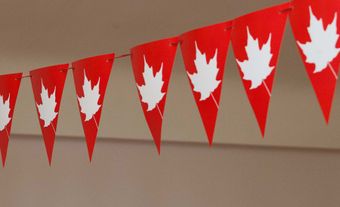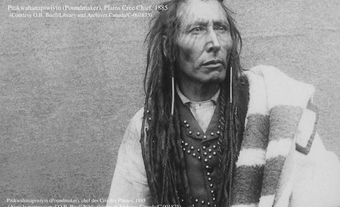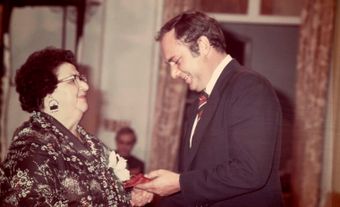Residential Schools
Residential schools were established by Christian churches and the federal government to assimilate Indigenous children into Euro-Canadian society.
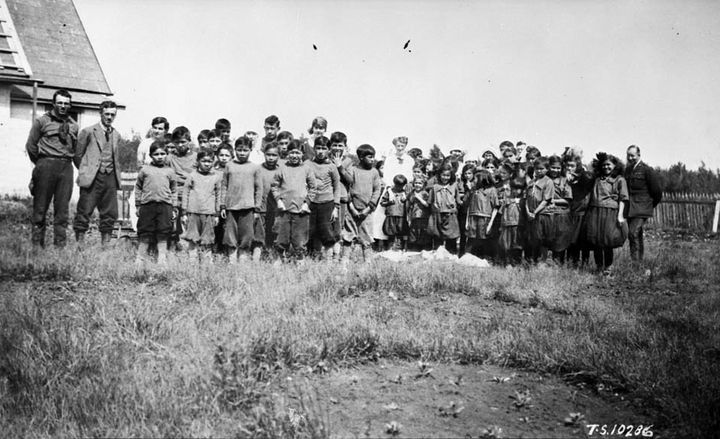
-
January 01, 1620
History
Mission Schools for Indigenous Children Established
For more than two hundred years, from the early 1600s to the 1800s, religious orders run mission schools for Indigenous children — the precursors to the Government of Canada’s residential school system.
-
January 01, 1831

History
Mohawk Institute Begins to Accept Boarders
Run by the Anglican Church, the Mohawk Institute in Brantford, Upper Canada [Ontario], becomes the first school in Canada’s residential school system. At first, the school only admits boys. In 1834, girls are admitted.
-
March 20, 1845
History
Bagot Report
The Bagot Commission (1842-1844) report is presented to the Legislative Assembly. It proposes that separating Indigenous children from their parents is the best way to assimilate them into Euro-Canadian culture. The commission also recommends that the Mohawk Institute be considered a model for other industrial schools.
-
June 10, 1857
History
The Gradual Civilization Act
The Gradual Civilization Act requires male Status Indians and Métis over the age of 21 to read, write and speak either English or French, and to choose a government-approved surname. It awards 50 acres of land to any “sufficiently advanced” Indigenous male, and in return removes any tribal affiliation or treaty rights.
-
March 29, 1867
History
Federal Responsibility
Under the Constitution Act (British North America Act), the federal government takes authority over First Nations and land reserved for First Nations (see Reserves). This authority would later extend to education of Status Indians.
-
April 12, 1876

History
Indian Act
The Indian Act is introduced. The Act aims to eradicate First Nations culture in favour of assimilation into Euro-Canadian society. The Act also reinforces that Status Indians must voluntarily give up status and treaty rights to vote federally. Status Indian women are barred from voting in band council elections.
-
July 01, 1883
History
Residential Schools Authorized
Based on the recommendations of the Davin Report, Sir John A. Macdonald authorizes the creation of the residential school system, designed to isolate Indigenous children from their families and cut all ties to their culture.
-
April 19, 1884
.jpg)
History
Creation of Residential Schools
Amendments to the Indian Act of 1876 provide for the creation of residential schools, funded and operated by the Government of Canada and Roman Catholic, Anglican, Methodist, Presbyterian and United churches.
-
January 01, 1896
History
Growing Number of Residential Schools
The number of schools across Canada quickly climbs to over forty. Each school was provided with an allowance per student, which led to overcrowding and an increase in illnesses within the institutions.
-
November 15, 1907
History
Health at Residential Schools
After visiting 35 residential schools, Dr. Peter Henderson Bryce, chief medical officer for Canada’s Department of the Interior and Indian Affairs (1904–21), reveals that Indigenous children are dying at alarming rates – with the mortality rate of enrolled students as high as 25 per cent. This number climbs to 69 per cent after students leave school.
-
April 01, 1920
History
Residential Schools Become Mandatory
Deputy Superintendent General of Indian Affairs, Duncan Campbell Scott, makes attendance at residential school mandatory for every First Nations child between 7 and 16 years of age. This policy was also inconsistently applied to Métis and Inuit children.
-
January 01, 1922
History
The Story of a National Crime Published
Dr. Peter Henderson Bryce publishes The Story of a National Crime, exposing the Canadian government’s suppression of information on the health of Indigenous peoples. Bryce argues that Duncan Campbell Scott and the ministry of Indian Affairs neglected Indigenous health needs and notes a “criminal disregard for the treaty pledges.”
-
January 01, 1930
History
Residential School Network Expands
More than 80 institutions are in operation across Canada — the most at any one time — with an enrolment of over 17,000.
-
January 01, 1934
History
Inuit Education Research Conducted by Federal Government
For the first time, the Canadian government conducts research into Inuit education. J. Lorne Turner, Director of Lands, Northwest Territories and Yukon Branch, Department of the Interior urges the government to provide formal education to Inuit children.
-
February 15, 1936
History
Report of the Royal Commission Appointed to Investigate the Conditions of the Métis Population in Alberta
In December 1934, the Alberta government appoints Albert Freeman Ewing to report on Métis living conditions. The report indicates that 80 per cent of Métis children in Alberta received no education. The report suggests building schools for Métis children.
-
January 01, 1948
History
Thunderchild Indian Residential School Destroyed
Four students are investigated for arson. Others reportedly cheer as they watch the school burn. This was one of dozens of fires set by students as a form of resistance at residential schools across the country.
-
September 04, 1951
History
The Sixties Scoop
The “Sixties Scoop” begins after amendments to the Indian Act give provinces jurisdiction over child welfare on reserves. Over the following decades, more than 20,000 First Nation, Métis and Inuit children are “scooped” from their homes and adopted into predominantly non-Indigenous families, leaving many adoptees with a lost sense of cultural identity.
-
January 01, 1955
History
Residential School System Expands in Northern Canada
The federal government takes over the administration of many church-run residential schools in the North. Over the next decades, six schools open in the Western Arctic.
-
September 01, 1959
History
Two Residential Schools Open in Inuvik, NWT
Grollier Hall and Stringer Hall open in Inuvik, housing 500 students. The majority of students are Inuvialuit children who were taken from their families.
-
January 01, 1960
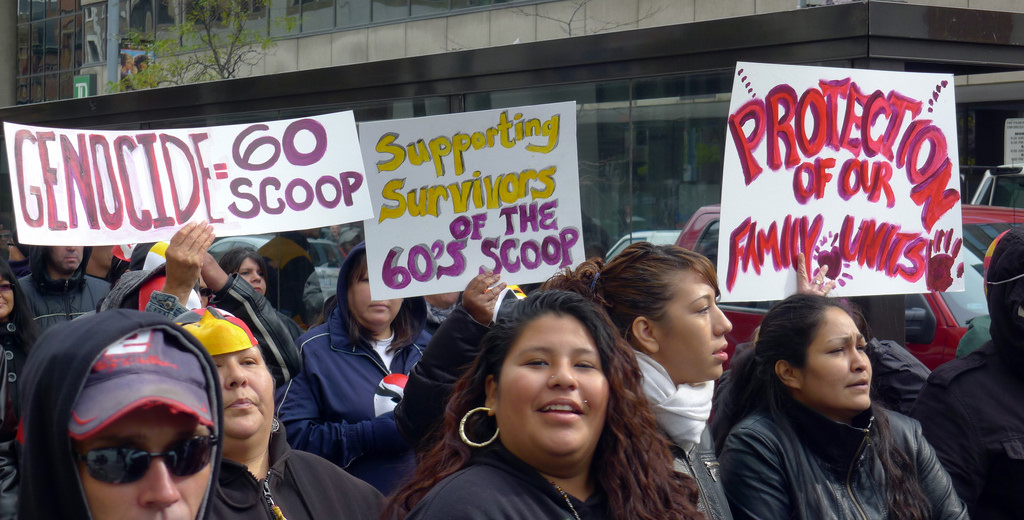
History
The Sixties Scoop
As residential schools closed, thousands of Indigenous children were taken from their families by provincial and federal social workers and placed in foster or adoption homes. Often, these homes were non-Indigenous. Some children were even placed outside of Canada. (See also Sixties Scoop.)
-
October 23, 1966
History
Chanie Wenjack Dies
Twelve-year-old Chanie Wenjack dies after escaping from the Cecilia Jeffrey residential school, near Shoal Lake, Ontario.
-
November 17, 1966
History
Coroner’s Inquest Into Chanie Wenjack’s Death
A coroner’s inquest into Chanie Wenjack’s death is held. The all-White jury finds that residential schools cause tremendous emotional and psychological problems. They recommend that “A study be made of the present Indian education & philosophy. Is it right?”
-
January 01, 1969
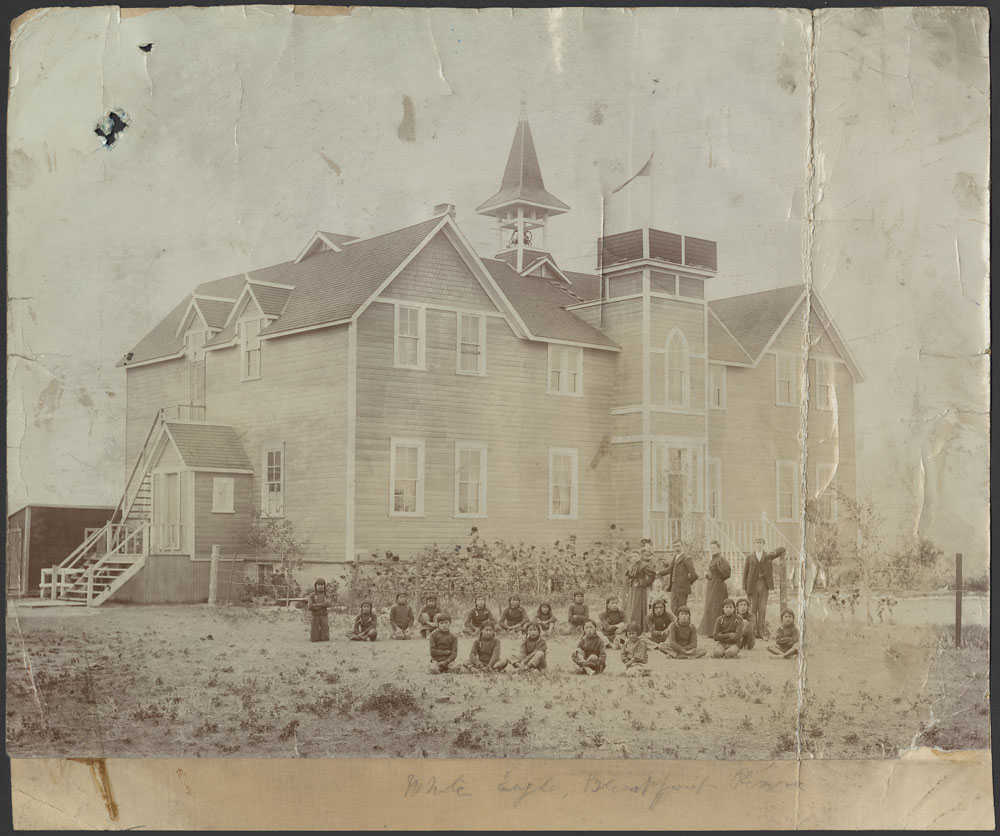
History
Authority for Residential Schools Transferred to Government
The Canadian government takes over responsibility for the remaining residential schools from the churches.
-
July 24, 1976
History
Île-à-la-Crosse Residential School Closes
After a series of fires in 1964 and 1972, Île-à-la-Crosse Residential School permanently closes in 1976. It is replaced by new locally administered schools — the Rossignol elementary and high schools.
-
January 01, 1979
History
28 Residential Schools Remain
Thousands of Indigenous students are enrolled at the 28 residential schools that were running in Canada at the time.
-
October 30, 1990

History
Phil Fontaine’s Testimony of Abuse at Residential Schools
Phil Fontaine, Head of the Assembly of Manitoba Chiefs, speaks publicly of the abuse he suffered at Fort Alexander Residential School. He calls for a public inquiry into the schools, which the federal government initiates in 1991.
-
August 26, 1991
History
Royal Commission on Aboriginal Peoples Initiated
In the wake of the Oka Crisis, Prime Minister Brian Mulroney initiates the Royal Commission on Aboriginal Peoples, with a mandate to study the evolution of the relationship between Indigenous peoples, the Government of Canada and Canadian society as a whole.
-
January 01, 1996
History
Last Federally Operated Residential School Closes
The last federally-run facility, Gordon’s Residential School in Punnichy, Saskatchewan, closes.
-
November 21, 1996
History
Final Report of the Royal Commission on Aboriginal Peoples
The 1996 report of the Royal Commission on Aboriginal Peoples stated that many of the Indian Act’s measures were oppressive, and noted that “Recognition as 'Indian' in Canadian law often had nothing to do with whether a person was actually of Indian ancestry.”
-
July 01, 1997
History
Grollier Hall Closes
In 1987, the Roman Catholic Church chooses not to renew its contract due to lack of “religious personnel.” Enrolment continues to decline throughout the 1990s until Grollier Hall is turned over to Aurora College in the summer of 1997, marking the end of the residential school system in the North.
-
September 01, 2007
Reconciliation
Indian Residential Schools Settlement Agreement Comes into Effect
The Indian Residential Schools Settlement Agreement provides compensation to Survivors, including the Common Experience Payment, which is based on the number of years they attended residential school. Claims of sexual and physical abuse are assessed through an independent process. The Agreement focuses on funding and supporting Indigenous health and healing services and also establishes funds for the Truth and Reconciliation Commission (TRC).
-
June 01, 2008
Reconciliation
Truth and Reconciliation Commission of Canada is Established
The Canadian government authorizes the Truth and Reconciliation Commission of Canada to document the truth of Survivors, families and communities and inform all Canadians about what happened in residential schools. It is funded by the Indian Residential School Settlement Agreement.
-
June 11, 2008
Reconciliation
Formal Apology to Former Residential Schools Students
Prime Minister Stephen Harper, on behalf of the Government of Canada, delivers a formal apology in the House of Commons to former students, their families, and communities for Canada's role in the operation of residential schools. Provincial and territorial apologies follow in the years ahead.
-
June 16, 2010
Reconciliation
First National Truth and Reconciliation Event
The Truth and Reconciliation Commission of Canada hosts its first national event, in Winnipeg, MB. It explores the history of the residential school system, the experience of former students and their families and the impact such institutions had on Indigenous peoples in Canada. Over the next five years, six more events follow in cities around the country, with a national closing ceremony in Ottawa.
-
March 27, 2014
Reconciliation
Final National Truth and Reconciliation Event
The seventh and final national event of the Truth and Reconciliation Commission of Canada (TRC) takes place over three days in Edmonton, Alberta inviting individuals, families, and communities to share their experiences at residential schools.
-
May 26, 2014
Reconciliation
Residential School Monument in Winnipeg
A monument to honour the Survivors of residential schools was unveiled in Winnipeg, Manitoba, at the Peace Garden outside of the Canadian Museum for Human Rights.
-
June 02, 2015
Reconciliation
Summary Report of the Truth and Reconciliation Commission Released
The Truth and Reconciliation Commission releases the summary of its final report on the residential school system and the experiences of survivors, characterizing Canada’s treatment of Indigenous peoples as “cultural genocide.” The report includes 94 calls to action aimed at redressing the legacy of residential schools and assisting in the process of reconciliation.
-
November 03, 2015
Reconciliation
National Centre for Truth and Reconciliation Opens
The National Centre for Truth and Reconciliation, a permanent archive of materials, documents and testimonies on residential schools gathered during the Truth and Reconciliation Commission,opens at the University of Manitoba in Winnipeg.
-
December 15, 2015
Reconciliation
Final Report of the Truth and Reconciliation Commission Released
The Truth and Reconciliation Commission releases its final report, Honouring the Truth, Reconciling for the Future. Prime Minister Justin Trudeau, who attended the ceremonial release of the report,commits his government to implementing all of the 94 recommendations set out in the June 2015 summary report.
-
May 30, 2016
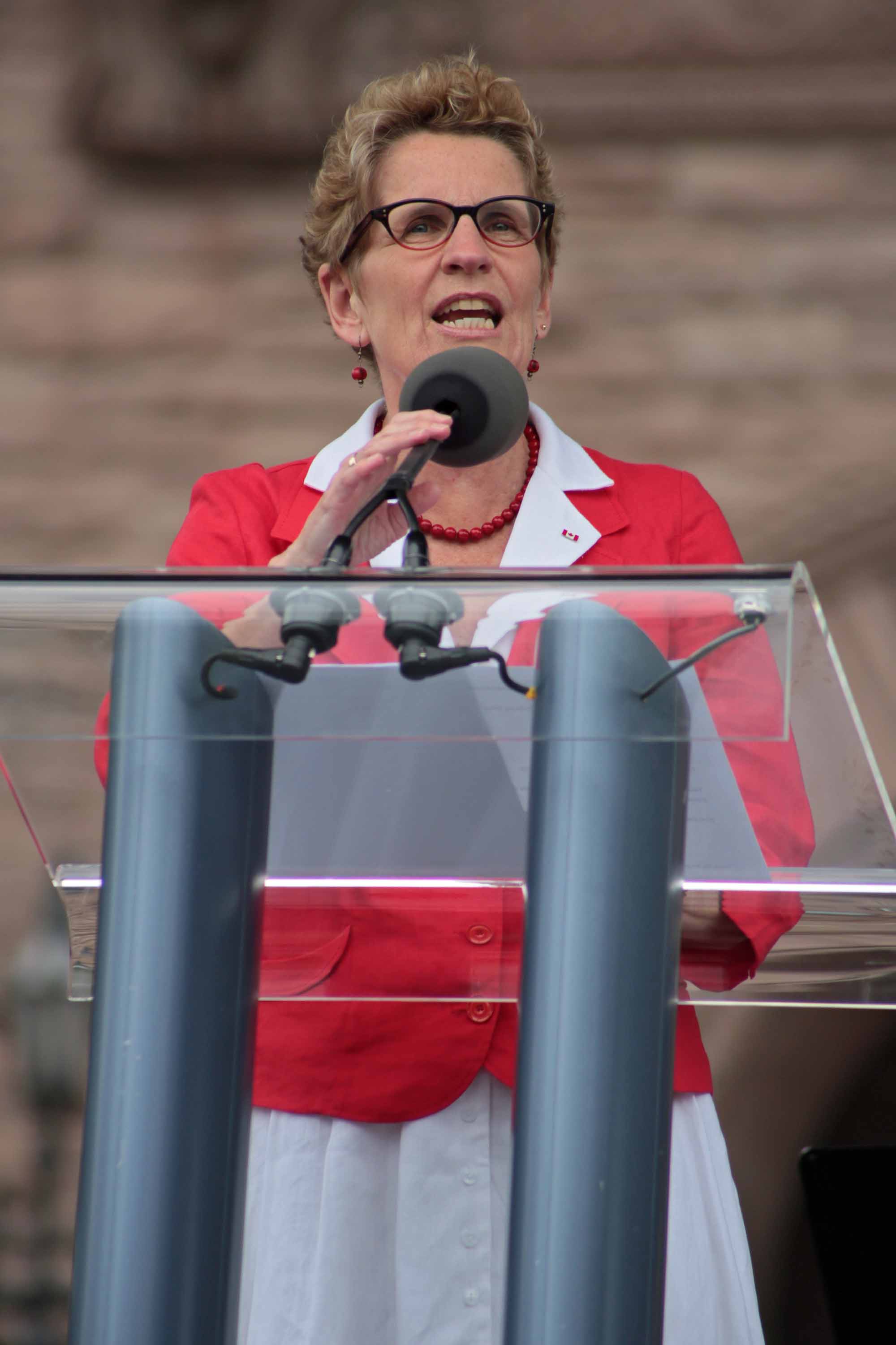
Reconciliation
Premier Wynne Issues Residential Schools Apology
In response to the recommendations of the Truth and Reconciliation Commission, Ontario premier Kathleen Wynne formally apologizes on behalf of the provincial government for the abuses committed against Indigenous peoples in the residential school system, as well as for the oppressive policies and practices supported by past Ontario governments. The province announces a $250-million, three-year investment in several initiatives aimed at reconciliation.
-
October 06, 2017
Reconciliation
Settlement for Sixties Scoop Survivors
The federal government announced a settlement of $800 million with Sixties Scoop survivors.
-
November 24, 2017
Reconciliation
Trudeau Issues Newfoundland and Labrador Residential Schools Apology
Prime Minister Justin Trudeau apologizes to the Survivors of residential schools in Newfoundland and Labrador who were excluded from Stephen Harper’s 2008 apology because residential schools there were not run by the federal government and were established before Newfoundland joined Confederation in 1949. Survivor Toby Obed, who was instrumental in the class-action lawsuit against the federal government, accepted Trudeau’s apology on behalf of his community. However, Gregory Rich, Innu Nation Grand Chief, refused Trudeau’s apology on behalf of the Innu Nation, saying it was too narrow.
-
June 03, 2019
Reconciliation
Final Report of the National Inquiry into Missing and Murdered Indigenous Women and Girls Released
The final report of the National Inquiry into Missing and Murdered Indigenous Women and Girls reveals that persistent and deliberate human rights violations are the source of Canada’s staggering rates of violence against Indigenous women, girls and LGBTQ2S people. The report gives 231 calls for justice to governments, police forces and institutions.
-
June 23, 2021

History Reconciliation
Hundreds of Possible Unmarked Graves Found at Saskatchewan Residential School
One month after the discovery of 200 possible unmarked graves at a former residential school in Kamloops, BC, ground-penetrating radar revealed an estimated 751 possible unmarked graves at the site of the former Marieval Indian Residential School in Cowessess First Nation territory, about 150 km east of Regina. The radar search began on 1 June. The Marieval school was open from 1899 to 1997 and was administered by the Catholic Church until 1968.
-
June 28, 2021

Reconciliation
BC Commits $12 Million to Help First Nations Search More Residential School Sites
The British Columbia government committed $12 million to help First Nations in the province search the grounds of former residential schools for more unmarked children’s graves. Some of the funds were also directed toward mental health supports. The province said it would work with the First Nations Health Authority (FNHA), Indigenous Services Canada, and Crown-Indigenous Relations and Northern Affairs Canada to ensure that the funds went to projects led by First Nations.
-
July 12, 2021

History Reconciliation
160+ Possible Unmarked Graves Found at Another BC Residential School
Penelakut Tribe Chief Joan Brown said in a statement that more than 160 “undocumented and unmarked” graves had been found on Penelakut Island, formerly Kuper Island, off the coast of Vancouver Island southeast of Nanaimo. The possible graves were found at the site of the Kuper Island Industrial School, a residential school run by the Catholic Church from 1890 to 1969 and by the federal government from 1969 until 1975.


